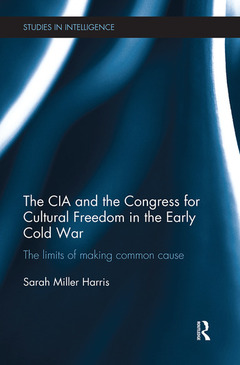The CIA and the Congress for Cultural Freedom in the Early Cold War The Limits of Making Common Cause Studies in Intelligence Series
Auteur : Miller Harris Sarah

This book questions the conventional wisdom about one of the most controversial episodes in the Cold War, and tells the story of the CIA's backing of the Congress for Cultural Freedom.
For nearly two decades during the early Cold War, the CIA secretly sponsored some of the world?s most feted writers, philosophers, and scientists as part of a campaign to prevent Communism from regaining a foothold in Western Europe and from spreading to Asia. By backing the Congress for Cultural Freedom, the CIA subsidized dozens of prominent magazines, global congresses, annual seminars, and artistic festivals. When this operation (QKOPERA) became public in 1967, it ignited one of the most damaging scandals in CIA history. Ever since then, many accounts have argued that the CIA manipulated a generation of intellectuals into lending their names to pro-American, anti-Communist ideas. Others have suggested a more nuanced picture of the relationship between the Congress and the CIA, with intellectuals sometimes resisting the CIA's bidding. Very few accounts, however, have examined the man who held the Congress together: Michael Josselson, the Congress?s indispensable manager?and, secretly, a long time CIA agent. This book fills that gap. Using a wealth of archival research and interviews with many of the figures associated with the Congress, this book sheds new light on how the Congress came into existence and functioned, both as a magnet for prominent intellectuals and as a CIA operation.
This book will be of much interest to students of the CIA, Cold War History, intelligence studies, US foreign policy and International Relations in general.
Preface
Introduction
1. Berlin: The Early Years
2. Intellectuals: From Communism to Anti-Communism
3. The Outbreak of Ideological Hostilities
4. From the Waldorf to Paris
5. Josselson Joins the Agency
6. A Congress for Cultural Freedom: Berlin, 1950
7. From Berlin to Paris: Josselson and the Congress in Transition
8. James Burnham’s Rival
9. The CIA and the Non-Communist Left
10. The 1952 Paris Festival
11. Encounter Magazine: The Congress's 'Greatest Asset' 12. New Management at the Agency
13. The 1955 Milan Congress and the End of Ideology
14. A Revolution of Intellectuals: Hungary, 1956
15. The Most Famous Article that Encounter Never Ran
16. The 1967 Scandal
Conclusion
Sarah Miller Harris is a lawyer and has a PhD in International Relations from the University of Cambridge, UK.
Date de parution : 05-2018
15.6x23.4 cm
Date de parution : 08-2016
15.6x23.4 cm
Thèmes de The CIA and the Congress for Cultural Freedom in the... :
Mots-clés :
CIA Contact; CIA; CIA’s Financing; Congress for Cultural Freedom; Senior CIA Official; Michael Josselson; CIA Involvement; Encounter magazine; CIA Agent; anti-Communism; CIA Officer; cultural Cold War; CIA Director; Max Reinhardt Theater; Soviet Peace Campaign; Irving Brown; Avenue Montaigne; International Organizations Division; Nicolas Nabokov; Waldorf Conference; Berlin Congress; Encounter’s Editor; McCarthy’s Investigations; American Committee; CIA Case Officer; CIA History; CIA’s Intervention; CIA Covert Operation; CIA Covert; CIA Front



